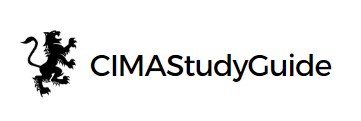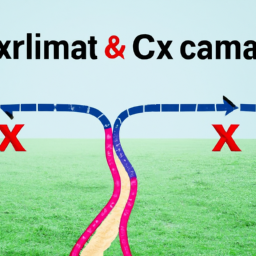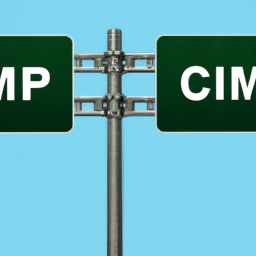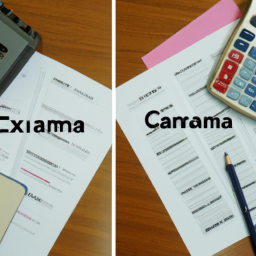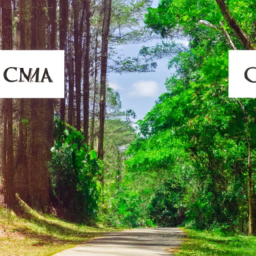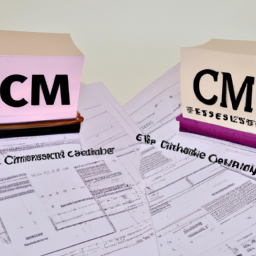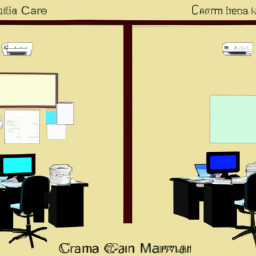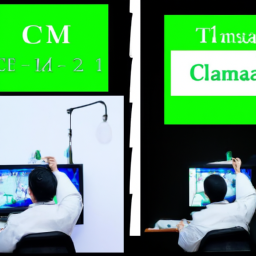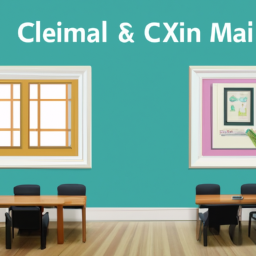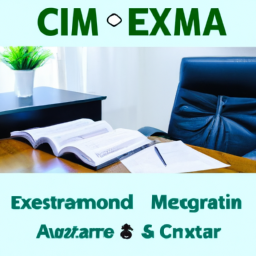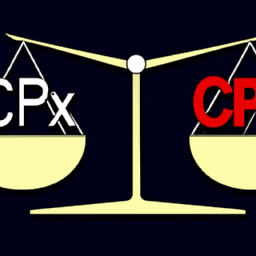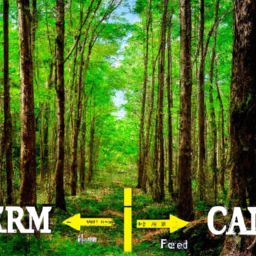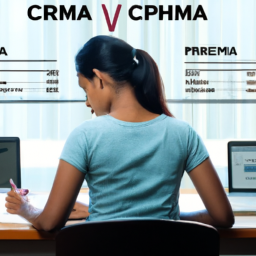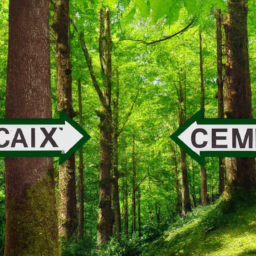Are you ready to embark on a journey towards financial success? The path to achieving your goals may require a professional certification that sets you apart in the competitive world of finance.
In the realm of certifications, the CIMA Exam and the CAIA Exam stand tall as beacons of excellence, guiding ambitious individuals like yourself towards greater heights. But which one is right for you? Like two sides of a coin, the CIMA and CAIA exams offer distinct advantages and opportunities.
To make an informed decision, you need to carefully analyze their differences, evaluate your goals, and consider the testimonials of those who have succeeded in their respective fields. In this article, we will delve into the details, providing a comprehensive overview of both exams, highlighting their disparities, and presenting success stories to help you make the right choice.
So, buckle up and get ready to explore the captivating world of finance certifications.
Key Takeaways
- CIMA Exam and CAIA Exam are both professional certifications in finance that offer significant career growth in the finance industry.
- CIMA Exam focuses on financial strategy, risk management, and investment decision-making, while CAIA Exam specializes in alternative investments, risk management, and ethics.
- CIMA Exam requires 12-18 months of study time and costs $1,000-$4,000 in exam fees, while CAIA Exam requires 6-12 months of study time and costs $2,500-$4,000 in exam fees.
- CIMA certified professionals advance into higher-level positions such as finance managers, financial controllers, and CFOs, while CAIA certified professionals secure roles in alternative investments, hedge funds, and private equity firms.
Overview of the CIMA Exam
If you’re looking to skyrocket your career in finance, the CIMA Exam is the perfect opportunity to showcase your expertise and stand out from the competition.
As a financial analyst or advisor, you would approach the CIMA Exam with a strong analytical mindset. You would carefully analyze the CIMA exam content, which includes topics such as financial strategy, risk management, and investment decision-making.
In preparing for the exam, you would research information and evaluate different perspectives to ensure a comprehensive understanding of the material. Being able to communicate complex financial information in a clear and concise manner is crucial for a financial analyst or advisor.
You would write in plain language, avoiding jargon, to ensure that your recommendations are easily understandable for your clients or colleagues.
Now, let’s transition to the next section and explore the overview of the CAIA Exam.
Overview of the CAIA Exam
When considering which certification to pursue, it’s important to understand the structure and content of the CAIA Exam. As a financial analyst or advisor, you would approach this topic with an analytical mindset. You would carefully analyze the study resources available for the CAIA Exam, such as textbooks, practice exams, and online courses, to ensure you are fully prepared.
It’s also crucial to familiarize yourself with the exam format, which consists of two levels, each with multiple-choice and constructed-response questions. The CAIA Exam covers a wide range of topics, including alternative investments, risk management, and ethics. Being clear and concise in your understanding of these topics is essential for success.
Now, let’s explore the differences between the CIMA Exam and the CAIA Exam, and determine which certification is the right fit for you.
Differences Between the CIMA Exam and the CAIA Exam
To make an informed decision on which certification best suits your needs, consider the unique characteristics and focus of both the CIMA and CAIA exams, allowing you to choose the path that aligns with your professional aspirations and enhances your expertise in the financial industry.
When comparing the CIMA and CAIA exams, it is important to note that they have different exam structures. The CIMA exam consists of two levels: the Certificate in Business Accounting and the Professional Qualification. It covers a wide range of topics including financial management, risk management, and strategic management.
On the other hand, the CAIA exam focuses specifically on alternative investments and consists of two levels: Level I and Level II. It delves deep into topics such as hedge funds, private equity, and real estate investments.
Understanding these differences in exam structure will help you determine which certification is more aligned with your interests and career goals.
Moving forward, let’s explore some factors to consider when choosing between the CIMA exam and the CAIA exam.
Factors to Consider When Choosing Between the CIMA Exam and the CAIA Exam
When choosing between the CIMA Exam and the CAIA Exam, there are several factors to consider.
Firstly, you should take into account your personal interests and career goals. Analyze which certification aligns better with your long-term objectives and the areas of finance that you’re most passionate about.
Secondly, evaluate the industry demand and job market trends for each certification. Research the current and projected demand for professionals with CIMA or CAIA qualifications to ensure that you’re investing your time and effort in a certification that’ll enhance your career prospects.
Lastly, consider the time and financial investment required for each exam. Assess the amount of time you can allocate for studying and the financial resources you have available to prepare for and take the exam. This’ll help you make an informed decision that balances your aspirations with practical considerations.
Personal Interests and Career Goals
If you’re someone who wants to align your personal interests and career goals, figuring out whether to pursue a CIMA or a CAIA certification can be a crucial decision. As a financial analyst or advisor, you need to carefully analyze data, research information, and evaluate different perspectives before making a recommendation.
When considering personal interests and career goals, it’s important to think about the potential for career progression and job opportunities. Both the CIMA and CAIA certifications can open doors in the finance industry, but they have different focuses.
CIMA is geared towards management accounting and provides a broad skill set for roles in financial planning, analysis, and decision-making. On the other hand, CAIA specializes in alternative investments and is ideal for those interested in hedge funds, private equity, and venture capital.
Understanding the industry demand and job market trends will help you make an informed decision about which certification aligns with your personal interests and career goals.
Industry Demand and Job Market Trends
Consider the industry demand and job market trends to determine which certification best aligns with your personal interests and career goals. To make an informed decision, it’s important to analyze the current industry demand and job market trends. Here are three factors to consider:
-
Growth Potential: Research the growth potential of both CIMA and CAIA certifications in the finance industry. Look for trends indicating which certification is in higher demand and has better job prospects.
-
Job Market Competition: Evaluate the level of competition in the job market for professionals with CIMA and CAIA certifications. Determine which certification gives you a competitive edge in securing desirable job positions.
-
Salary Expectations: Examine the salary expectations for individuals with CIMA and CAIA certifications. Compare the average salaries and potential earning potential to determine which certification offers better financial rewards.
By carefully considering the industry demand and job market trends, you can choose the certification that’ll maximize your career opportunities.
Now, let’s explore the next section about the time and financial investment required for each certification.
Time and Financial Investment
When considering which certification is right for you, it is important to evaluate the time and financial investment required. Both the CIMA and CAIA exams require a significant commitment in terms of studying and preparation. The CIMA exam consists of three levels, with an average passing rate of 45%, while the CAIA exam has two levels and a passing rate of around 70%.
To help you understand the time and financial investment required for each certification, let’s compare the costs and study time for both exams:
| Certification | Exam Fees | Study Time (Months) |
|---|---|---|
| CIMA | $1,000-$4,000 | 12-18 |
| CAIA | $2,500-$4,000 | 6-12 |
As you can see, the CAIA exam generally requires a higher financial investment compared to the CIMA exam. However, the study time for the CIMA exam is longer, requiring a commitment of 12-18 months compared to 6-12 months for the CAIA exam.
Considering these factors, it is important to carefully weigh the cost analysis and time management required for each certification before making a decision. Now, let’s explore some success stories and testimonials from CIMA and CAIA certified professionals.
Success Stories and Testimonials from CIMA and CAIA Certified Professionals
Are you curious about the success stories and testimonials from professionals who’ve become certified in either CIMA or CAIA? As a financial analyst or advisor, it’s important to analyze the career progression and salary potential of these certifications.
Many professionals who’ve obtained their CIMA certification have experienced significant career growth. They’ve been able to advance into higher-level positions such as finance managers, financial controllers, and CFOs. Additionally, CIMA certified professionals have seen an increase in their salary potential. Many report higher earnings compared to their non-certified counterparts.
On the other hand, CAIA certified professionals have also witnessed promising career opportunities and salary growth. They’ve been able to secure roles in alternative investments, hedge funds, and private equity firms, which often offer higher compensation packages.
Overall, both CIMA and CAIA certifications have proven to be valuable assets in the finance industry. They open doors to enhanced career prospects and increased earning potential.
Frequently Asked Questions
What is the passing score for the CIMA Exam and the CAIA Exam?
The passing score for the CIMA exam is 70%. In order to pass, you must achieve a score of 70% or higher.
Similarly, the passing score for the CAIA exam is also 70%. It’s important to note that these passing scores are set to ensure that candidates have a solid understanding of the material and are able to apply it effectively in real-world scenarios.
Achieving a passing score demonstrates your competency in the respective certification.
Can I take the CIMA Exam and the CAIA Exam at the same time?
Taking both the CIMA Exam and the CAIA Exam simultaneously can be challenging, but the benefits are substantial. According to recent data, individuals who hold both certifications earn an average of 27% more than those with just one.
By obtaining both certifications, you demonstrate a diverse skill set and a strong commitment to your career in finance. This combination of knowledge in investment management and alternative investments can open doors to a wider range of job opportunities and increase your earning potential in the industry.
Are there any prerequisites or qualifications required to sit for the CIMA Exam or the CAIA Exam?
To sit for the CIMA exam, there are certain prerequisites that need to be met. These include having a bachelor’s degree or equivalent, or having three years of professional experience in finance or investment-related fields.
On the other hand, the CAIA exam has specific qualifications required, such as having a bachelor’s degree or equivalent, or having four years of professional experience in alternative investments or related fields.
These prerequisites and qualifications ensure that candidates have the necessary knowledge and experience to be successful in their respective exams.
Can I transfer my CIMA Exam credits to the CAIA Exam or vice versa?
Transferring exam credits between CIMA and CAIA is not possible. Each certification has its own distinct exam structure. CIMA focuses on management accounting and offers a four-level exam series, while CAIA is centered around alternative investments and consists of two levels. The exams cover different topics and require separate preparation.
It’s important to carefully consider your career goals and interests when deciding which certification is right for you.
Are there any continuing education requirements for maintaining the CIMA or CAIA certification?
Yes, both the CIMA and CAIA certifications have continuing education requirements to maintain the certification.
CIMA requires certified professionals to complete 35 hours of continuing education every two years, while CAIA requires 40 hours of continuing education every two years.
These requirements ensure that professionals stay updated with the latest knowledge and skills in the field.
When comparing with other finance certifications, it’s important to consider the continuing education requirements as they contribute to the ongoing professional development of individuals in the industry.
Conclusion
Based on the comparison between the CIMA Exam and the CAIA Exam, it’s clear that both certifications have their own unique advantages and differences.
While the CIMA Exam focuses more on management accounting and strategic financial management, the CAIA Exam delves deeper into alternative investments and hedge funds.
However, one success story that stands out is the journey of John, a financial advisor who pursued the CIMA certification. With his newfound knowledge and skills, he was able to guide his clients through market volatility and help them achieve their financial goals.
Like a compass in a storm, John’s expertise provided a sense of direction and stability amidst uncertainty.
Ultimately, the decision between the CIMA Exam and the CAIA Exam depends on your career goals and interests. Consider your strengths, aspirations, and the specific areas of finance you wish to specialize in.
Whichever path you choose, remember to approach it with an analytical mindset, communicate clearly and concisely, and always prioritize the best interests of your clients.
